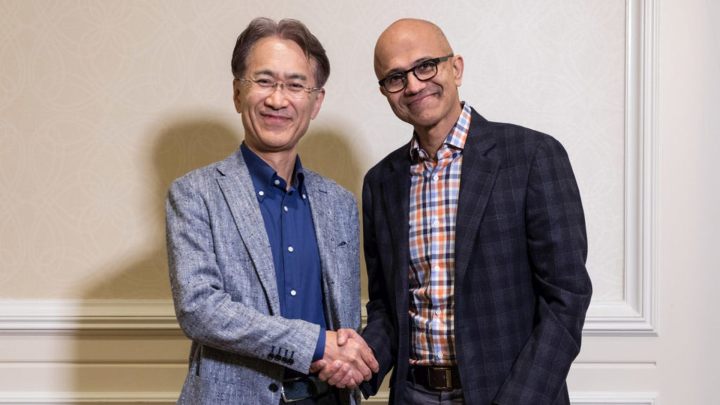
Sony and Microsoft are teaming up on cloud-based gaming and A.I. solutions. This new partnership will see Sony bring its gaming and content streaming to Microsoft’s Azure cloud-computing platform.
Azure is a cloud-computing service that uses Microsoft’s data center and is available in 140 countries in 54 regions worldwide. This joint effort is aimed at developing future cloud solutions to support both companies’ gaming and content-streaming services. What could this mean for gamers? Sony and Microsoft are likely preparing for whatever Google Stadia plans to bring to the table, and aiming to produce results under the PlayStation and Xbox brands that are more robust and capable than current offerings like PlayStation Now.
Gamers and tech enthusiasts have been keeping their eyes on the horizon, anticipating the next generation of home gaming consoles and whatever bits of information leak out prior to an official rollout. The big curveball with this wait was the announcement of Google Stadia, ta streaming platform poised to take on Nintendo, Sony, and Microsoft. Stadia aims to allow gamers to access next-gen and current-gen gaming content no matter what type of hardware they have, and to stream high-quality gaming via the internet.
We recently reported that a newly revealed Sony patent seems to be related to a PlayStation-branded competitor to Google Stadia. With this partnership revealed, we’re likely to see even more developments along this line. Does this mean that there will be a single subscription service for both Xbox and PlayStation? Not likely, but not impossible. What’s more likely is that the two will have their own respective services, which will be boosted by collaboration. The two major companies playing nice could even extend into crossplay conversations, but we’ll have to wait and see.
“PlayStation itself came about through the integration of creativity and technology,” Sony CEO Kenichiro Yoshida said in a press release. “Our mission is to seamlessly evolve this platform as one that continues to deliver the best and most immersive entertainment experiences, together with a cloud environment that ensures the best possible experience, anytime, anywhere. For many years, Microsoft has been a key business partner for us, though of course the two companies have also been competing in some areas. I believe that our joint development of future cloud solutions will contribute greatly to the advancement of interactive content.”

Video game streaming of this kind has been attempted in various forms before, but Stadia seems like a plausible attempt at changing the landscape of home console gaming, largely due to Google’s incredible reach and established cloud-computing to power it.
Beyond cloud gaming and content streaming, the partnership also extends to A.I. and semiconductors. Sony will be sharing its cutting-edge image sensors with Microsoft’s Azure A.I. tech and Microsoft, in turn, will be working its advanced A.I. platform and tools into Sony’s consumer products. This is a monumental partnership that should be beneficial to consumers across various entertainment and productivity platforms.
In the wake of this revelation and Sony’s Thursday announcement that it would repurchase up to 4.8% of the total number of stock shares issued — worth approximately $1.82 billion, Sony’s stock skyrocketed 9.89% to levels not seen since December 2018. The buyback period will last from May 17, 2019 to March 31, 2020.
Updated May 17, 2019: Updated to include information about Sony’s stock surge.



